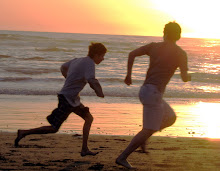Suddenly, I wake up. I'm in the mezzanine at A.C.T., watching Vigil, with Olympia DuKakis and Marco Barricelli. It's intermission.
The woman to my left has a small faux leopard-skin pillow that she keeps against the small of her back. She's wearing a matching blouse. She's pretty, on the very last day of 49, blonde on top of brunette, a tall woman with short fingers and a lot of wrist bangle and billidoux. She's saying to the two men to her left that she completely sympathizes with Grace, the dying woman in the play. "I'm not going to have anybody when I die."
"That's why people have kids," says the man next to the man next to her.
"But I don't have any kids," she replies.
The man next to her appears to be her husband. But he doesn't fit her, except that he's tall. He's been to Big and Tall Men but all he got was blue jeans and a sleeveless wool sweater. This doesn't go with anything she's wearing or thinking about. You get the feeling he's out of her league. My first thought is that the escort married a client. He's from a small town. She went to college. He made his money with a hardware store. Her father loved hardware stores. It's a stretch but he's safe and he's rich. He started out on a whim as he always does. In the beginning he was full-hearted, now he's half-hearted. The black underwear has worn off. But it's okay. He doesn't talk much and she doesn't mind. They're taking care of each other. They're an echo from the play.
"But there's always my kids," he says. "They're nice."
She drops her head. "Danny's fiancee is a horror."
The man falls silent. She puts one hand on his arm and then another hand and then takes away the first and puts that on top, like that child's game you play. And then she squeezes. "No he's not. I didn't mean that. I mean I just want to die with people around me I know."
He nods but doesn't say anything because perhaps he notices that the people in the row in front of us seem to be listening.
The lights go down. The play goes down with it.
During the last 10 minutes it seems Panych has had a misunderstanding with his characters. As though he said to them, 'Should I be funny, should I be serious? I've been clever but what can I do now?' The characters shake their heads. They're of several minds.
He settles for sentimentality. That resonates here and there. Someone in back of me is clearly choked up. But the woman in front of me is snoring. Next to her the man is cleaning out his ear and making a terrible racket.
Lights up. Two rounds of bows. People get up to leave and it's as though the play has spilled over its banks into the audience. Everyone is old. The youngest man is wearing a cap with a pin from the Boer War. I notice another man wearing a sneaker but it's on a wooden leg. Meanwhile, Olympia Dukakis has gone to photo shop. She's replicated. That white hair in a page boy cut extends as far as the eye can see. Along with men in old black check coats, badly cut red-tinted hair pieces, gigolos of yesteryear with women bouffed and pouffed. Ancient CEOs, heads of small states now living in Atherton, great grandmothers from San Ramon. Everybody feeling the dead weight of age. Men hobbling off to the can, totally exhausted from their naps. Women slowly turning in circles, holding on to the banister. Trying to remember something or other.
It's the play and it's the times. This is the last theater audience. Who will replace them? They're the same ones that go hear a lecture on the Iliad at Stanford. As stricken as they are, they're holding up local culture.
And so that's all to the good, but you realize once more that this is going to be the scene from here on in: the theater is going to include very last boomer's story of becoming old and irrelevant, and the audience will always be coming to get some last atta-boys, wishing to God that someone could explain what happened in a life and how to go on without thinking too much.
I get to the garage on O'Farrell and the herd is flowing into the elevator and out at each floor. People go to their fine cars. You notice that each car has a noticeable dent. From the time the driver forgot the steel post in back of them or the pedestrian in front of them, or got haunted by that stranger's face in the rear view mirror.
Apr 14, 2010
Subscribe to:
Post Comments (Atom)

1 comment:
It's the play and it's the times.
What a great line! Reread the entire piece, just so I could read that line again in context. A cousin to the "It was the best of times, it was the worst of times..."
I could almost imagine this entire scene in a novel. Really wish you would post more- you are such a brilliant writer.
Post a Comment